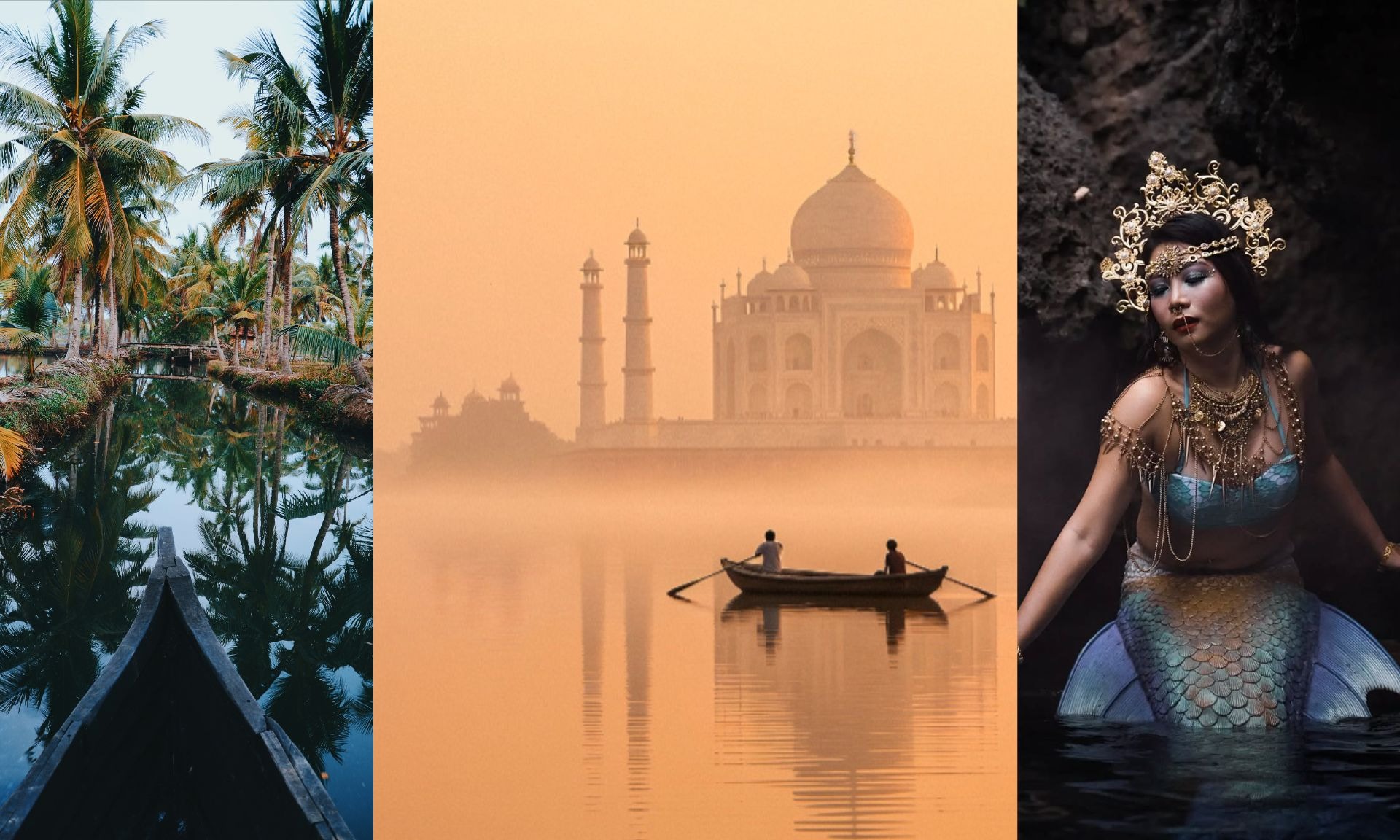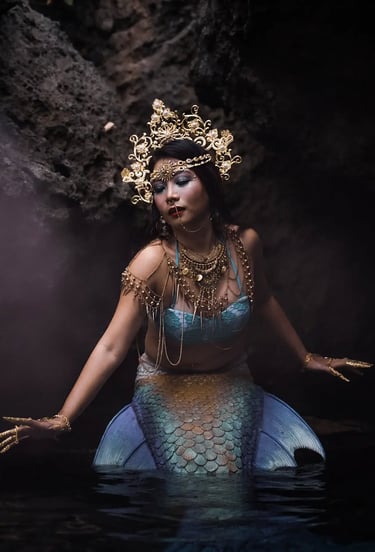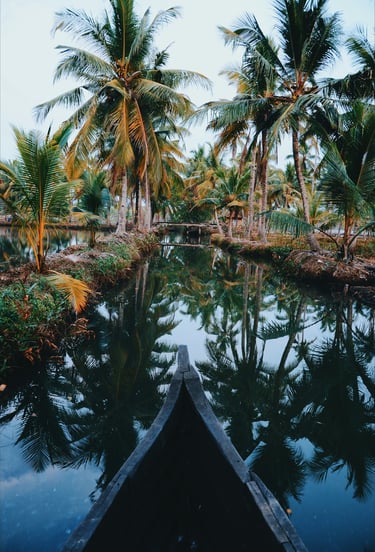
Performing in Paradise? What Mermaids Need to Know Before Taking a Gig in India
Before you pack your tail and hop on a flight to perform in India, read this. From dream performances in magical venues to serious safety red flags, this article dives into everything you need to know. With insider tips from seasoned mermaid manager Amarie, you'll walk away with real talk, red flag checklists, and the must-ask questions that could protect your health, your heart, and your career.
Corinna Schwozer & Mermaid Amarie
8/26/20256 min read
When you think of performing as a mermaid abroad, you probably imagine glimmering waters, adoring crowds, and magical adventures in faraway lands. And honestly? Sometimes it is just like that.
But sometimes it’s not.
Recently, the mermaid community was shaken by a serious incident involving a performer in India where one of the performing mermaids was raped by one of the organizers of the show. She found the courage to report it. And now, it’s our turn to step up to ensure that this doesn’t happen again.
Amarie Tolentino is one of the people leading this charge of making people aware of the situation — a seasoned mermaid performer and manager from the Philippines who has worked closely with Indian show organizers and helped many mers navigate the beauty and complexity of this unique opportunity.
We sat down with Amarie to talk honestly about what makes performing in India so tempting, what the risks are, and how to protect yourself or your performers if you're ever invited to join a show.
🧜♀️ Where the Magic Happens
Amarie has been to North, Central, and South India, but one place stole her heart: Kerala.
“Kerala has stunning beaches, beautiful people, and food that tastes surprisingly like home,” she laughs. “If you're going to India, this is one of the places I’d definitely recommend.”
The shows themselves can be enchanting — huge crowds, full costumes, incredible venues. When things are well-organized, the energy is electric. You feel like you’re part of something big.
But — and it’s a big but — not every show is created equal.
⚠️ The Risks Behind the Curtain
Amarie doesn’t sugarcoat it.
“Women’s independence isn’t viewed the same way in India as in the Philippines,” she explains. “That doesn’t mean you’re always unsafe — but it does mean you need to be vigilant.”
One major difference? Time.
“India time is… something else,” she says, half-joking. “You might wait weeks for confirmation, then suddenly be told you’re flying tomorrow. It can be chaotic.”
But the real risks go deeper. In some shows, performers are overworked. There’s no clear schedule. Little rest. Poor communication. Or worse — unsafe water and no medical plan if something goes wrong.
And yes, there have been serious incidents, including a case of sexual assault that rocked the community.
“It’s a wake-up call,” Amarie says. “We love India. But love doesn’t mean ignoring the problems.”
✅ What Responsible Management Looks Like
Amarie doesn’t just point out the problems — she’s part of the solution.
As someone who has been managing mermaids professionally, safety and well-being are always top priorities. Things aren’t always perfect, and we often have to adapt — but we always do our best to ensure our performers are safe and supported.
Here’s the kind of support and protection we provide:
🔒 Pre-Show Vetting
We only work with clients whom we had experience with, they check venues, and vet event organizers. No deal moves forward without background checks and clear communication about expectations, responsibilities, and safety standards.
📄 Clear Contracts
We ensure every performer has a detailed contract outlining pay, accommodations, working hours, safety measures, cancellation policies, and emergency protocols — no vague terms.
🏨 Secure Accommodation & Transport
We handle safe, clean, and reliable accommodations and transportation, so performers aren’t left figuring things out alone in a foreign country.
🌐 Local Point of Contact
There's always a trusted local contact or coordinator in India to assist mermaids on the ground, whether it's for logistics, language, or emergencies.
🩺 Health & Water Safety
We assess water quality in advance and have health precautions in place. If water even looks unsafe, mermaids are encouraged not to swim. Issue is communicated with the managers and mermaids only resume performance if issue has been addressed.
We also ensure access to medical support if anything arises during a show.
📱 24/7 Communication
Performers can reach us at any time. We stay in close contact throughout the trip to make sure everything runs smoothly and safely.
At the end of the day, it’s not just about performing — it’s about making sure every mermaid feels protected, respected, and supported throughout the entire experience.
Amarie gave a great example that portrays well the difference between a show that went off the hinges and a well-structured and organized one:
“I recall an instance where most of the mermaids fell ill, leaving only two to cover a long shift from 2 PM to 10 PM. This was extremely exhausting and posed significant health risks for the performers.
In contrast, a well-organized show understands the importance of scheduling. For example, starting at 4 PM and ending at 9:30 PM, with 4-5 mermaids rotating shifts and performing in pairs during certain blocks, helps prevent overfatigue and ensures everyone stays safe and energized.”
India isn’t just a place. It’s an experience. A wild, colorful, all-senses-awake adventure.
“There’s a richness in Indian culture that just draws you in,” says Amarie. “You can feel it in the food, the music, the stories. It’s magical — and for mermaids, that magic feels like a natural fit.”
She’s right. In recent years, India has started embracing more fantasy-driven shows and experiences, and given that India doesn’t have a lot of mermaid performers themselves, they’ve been reaching out to especially Filippino mermaids but also other mermaids from Asia as well as Europe to bring in the extra magic of exotic-looking performers from abroad.
🌊 Why India?
🚩 Red Flags: What to Watch For
So, how can mermaids know if an offer is legitimate or risky?
Amarie shares these must-watch red flags:
For anyone being approached about a show or work opportunity in India, it's important to approach the process with a balance of excitement and caution.
Here are some red flags to watch out for in contracts, communications, and bookings:
📝 Contracts
No written agreement
Vague terms (no clear pay, schedule, or safety provisions)
One-sided penalties (all risk being put on you)
No mention of emergency plans or insurance (What if the show ends abruptly? What if you get sick during the show? What if the water isn’t safe?)
These “what ifs” matter. Always check if your contract covers health, safety, and emergency situations — before saying yes. Your well-being comes first.
💬 Communication
Rushed decisions/pressure to commit fast
Unclear details about the event, client, or venue
Frequent last-minute changes or confusing updates
✈️Bookings
Flights/accommodation booked last minute
No clear local contact or support on the ground
Unclear transport or accommodation info
✅ Tips:
Research the agency or client
Talk to others who’ve worked with them
Let someone back home know your plans
Take on the help of a mermaid manager that knows the ins and outs of the company you’re going to work with to not be left to your own devices
Trust your gut — if something feels off, it probably is.
Being aware and informed can make the difference between a positive experience and a risky situation. If something feels off, trust your instincts and don’t hesitate to ask questions or decline the offer.
🧠 Mindset Matters
If you're still considering a gig in India, Amarie says preparation is key — physically and mentally.
Be ready to adapt, speak up, and protect your energy.
Mental Preparation:
Stay calm and composed in unfamiliar or stressful situations.
Communicate clearly and assertively about your needs and boundaries.
Adapt quickly to changes or unexpected circumstances without compromising your well-being.
Trust your instincts and don’t hesitate to speak up if something doesn’t feel right.
Physical Preparation:
Maintaining good overall health and stamina to handle demanding shifts.
Being aware of your body’s limits and resting adequately between performances.
Preparing for different environmental conditions, such as water quality, temperature, and travel fatigue.
Bringing necessary supplies, like hydration, first-aid kits, and personal care items.
Ultimately, protecting your safety, health, and energy is about being proactive, informed, and self-aware. When you prioritize these, you can enjoy the experience while minimizing risks.
✋ If You’re Unsure… Pause.
Amarie knows how exciting these offers can be. But she also knows the cost of ignoring your gut.
“If you’re unsure — stop and ask,” she says. “Talk to others. Reach out to a manager. Or walk away. You don’t owe anyone your health or safety.”
What needs to change?
“More accountability,” says Amarie. “From show organizers, agents, everyone involved.”
She dreams of a mermaid industry where safety is non-negotiable. Where community means protection. And where performers don’t have to risk it all just to chase their dreams.
And at MerMapp — we’re with her.
Let’s keep sharing stories. Creating standards. And building a safer world for merfolk everywhere.
🌍 A Safer Future for All Mers

APPearl LTD
Nikiforou Vretakou, 5, Flat/Office 101
8035, Paphos, Cyprus
registration number: HE 433676
VAT number: 10433676W
Contact Us
+(357)96520653
contact@mermapp.com
©️ 2021-2025
Crafted with 💙
by APPearl LTD




